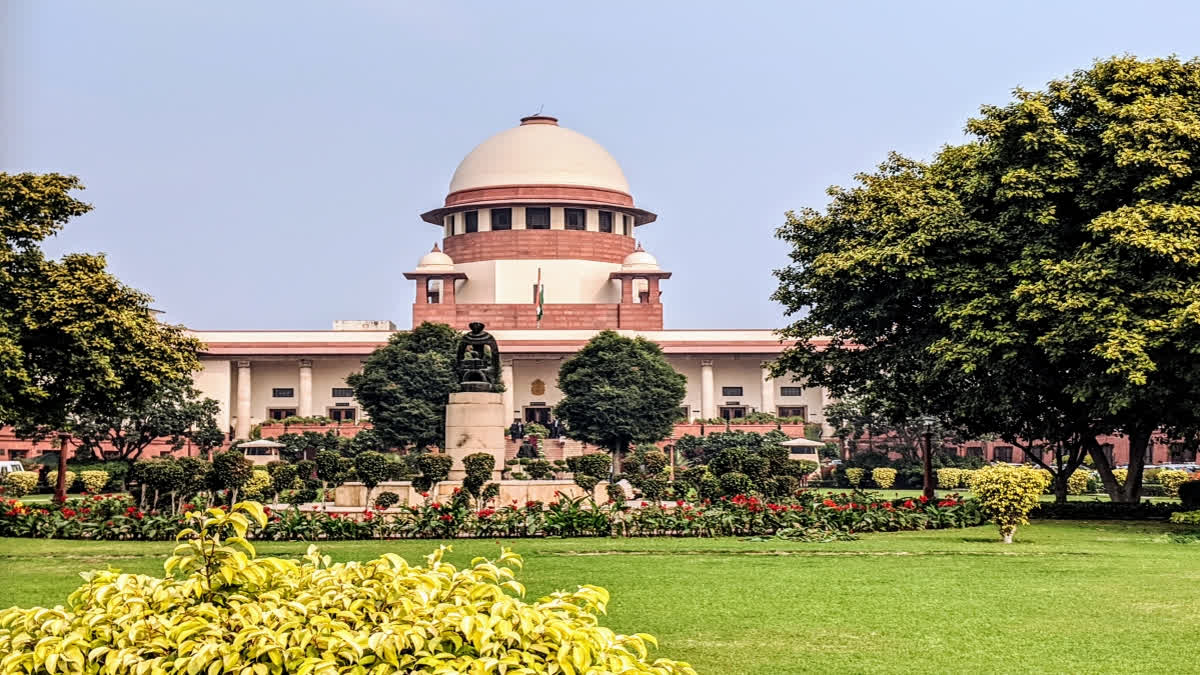New Delhi:As political parties slug out on the idea of redistribution of wealth to community, the Supreme Court on Tuesday said that, in today's times, Article 39 (b) and (c) of the Constitution, cannot be attributed a definition, which gives unbridled agenda of communism or socialism, as it is not our Constitution today.
The apex court emphasised that the interpretation of the Constitution must be nuanced to take care of what India is today and what India is moving towards tomorrow.
Article 39(b) in the Directive Principles of State Policy says that "the State shall, in particular, direct its policy towards securing that the ownership and control of the material resources of the community are so distributed as best to subserve the common good". Article 39(c) states that "the operation of the economic system does not result in the concentration of wealth and means of production to the common detriment".
Solicitor General Tushar Mehta, representing the Maharashtra government, before a nine-judge bench headed by Chief Justice of India D Y Chandrachud referred to the width of Article 39 and added that the question in which he is assisting the court is whether a private property would fall under Article 39? He elaborated on his perception of Article 39.
"The ownership and control of material of the community are so distributed best to subserve the common good. Each word in my submission is pregnant with making of a welfare state….ownership and control necessarily mean that something which do not belong to the government but in the larger interest of the common good there can be a law passed…," submitted Mehta, adding that he proposing to dissect the words in Article 39 (b).
The bench, also comprising Justices Hrishikesh Roy, B V Nagarathna, Sudhanshu Dhulia, J B Pardiwala, Manoj Misra, Rajesh Bindal, Satish Chandra Sharma and Augustine George Masih, is answering a reference whether the phrase "material resources of the community" in Article 39(b) of the Constitution includes what is privately owned.
Justice Nagarathna said "the question is whether the ownership of the community is also equivalent to ownership of an individual, or the ownership of the community also encompasses individual ownership of the property? Whether a community means an individual?"
Mehta said for example in my house a rare mineral has been discovered, it is not the property of the community rather the property of an individual then the keyword would be material resources. He added that if individual property has material resources, which can be distributed for the common good of the citizens.
The CJI told Mehta, "Your example is apposite. Your example shows that there will be instances where in respect of private property there is a community interest. This is clearly a case of that nature…..you say Uranium or any rare resource, which is a resource of the community therefore cannot be a strict dichotomy between private and public".
In Ranganatha Reddy case (1978), a five-judge of the apex court, by 4-1 majority, had clarified that privately-owned resources did not come under material resources of the community under Article 3 (b). However, Justice Krishna Iyer said in his dissenting opinion that it would include private property.
Today, the CJI further added that at the same time, the formulation by Justice Krishna Iyer is a little too extreme. "What that formulation says is that since the community consists of individuals therefore every individual is part of the community. Material resources of the community would also mean resources of the individual. That may be a little extreme….", said the CJI. Mehta agreed with the CJI.
The CJI said, it is important to be cognizant of the fact that all these constitutional provisions have an evolution and "we are not interpreting them in India of 1950s". Mehta said it is from nationalisation to disinvestment, that is the transition.
"We must therefore adopt an interpretation which is in keeping with the changing nature of times and the society. We must have an enduring interpretation….certain resources which are vested in private individuals may still have general bearing of public interest or community welfare, which requires regulation by the state," observed the bench.
